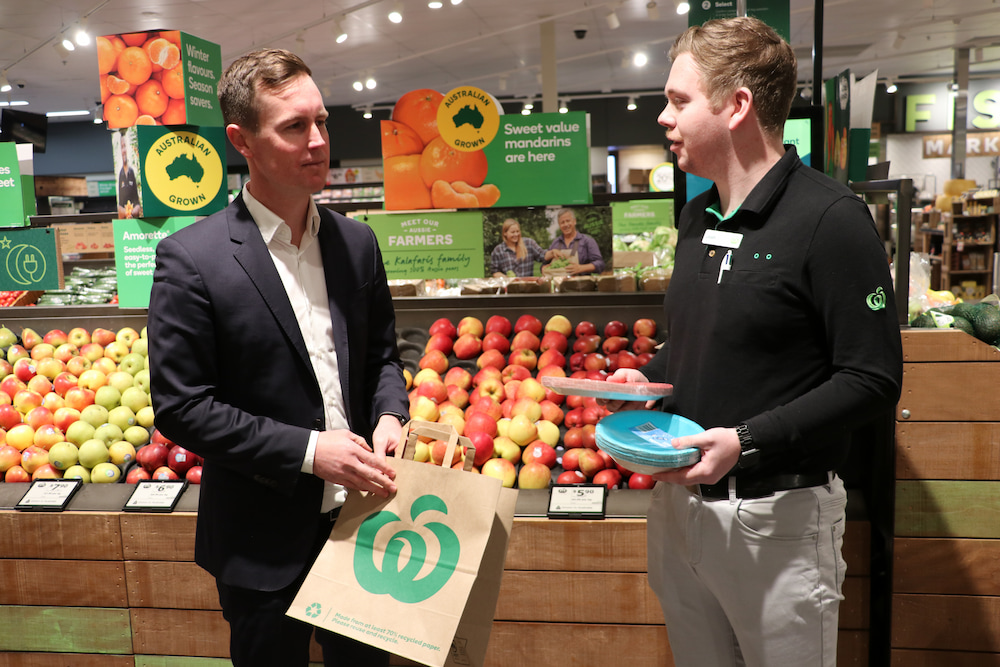Phase three of the ACT’s single-use plastics ban came into effect on Saturday 1 July.
Single-use plastic plates and bowls, expanded polystyrene loose fill packaging and expanded polystyrene produce and meat trays, and plastic microbeads in cosmetic and cleaning products are now outlawed in the ACT.
Heavyweight and boutique plastic bags (thicker than 35 microns) will be banned from 1 January 2024.
“Some of these single-use items often find their way into the environment, or they go straight into landfill where they persist for hundreds of years,” said Chris Steel, ACT Minister for Transport and City Services.
“Part of the reason we’re doing this phase-out is to make sure that we’re moving to more sustainable alternatives that break down or can be recycled more easily, and reused and remanufactured into new goods as part of a circular approach to the economy.”
Over the past two years, the ACT government has phased out single-use plastic cutlery and drinks stirrers, expanded polystyrene takeaway food and beverage containers, plastic bags thinner than 35 microns, single use plastic straws (exemptions for people with disabilities), cotton buds with plastic sticks, and oxo-degradable plastics.
- ACT’s single-use plastic ban to start in July (30 March 2021)
- Canberra’s public events will be plastic-free (26 November 2021)
- More major ACT events to go single-use plastic-free (8 March 2022)
- Plastic straws will be banned from July (23 May 2022)
“We’ve seen businesses really support the previous phases of the ban, and we’ve already seen businesses phase out some of the items that have now been banned from 1 July,” Mr Steel said.
“We’re looking forward to continuing to work with industry, to make sure that we’ve got more sustainable alternatives in stores.”
Woolworths Mawson, for instance, no longer uses heavyweight plastic bags, store manager Joshua Knox said: “We’ve implemented this effective immediately … Paper bags are the way moving forward for us.”
Eight out of 10 customers at the supermarket already bring their own shopping bags.
“ACT customers, especially at Mawson, have been very receptive of the change,” Mr Knox said. “They are always looking for sustainable options … at avoiding plastic where possible … So there has been a big uptake …”
Woolworths was happy to support the ACT government in the plastic ban, Mr Knox said. “Woolworths is always looking to be more sustainable in the way we operate. We hope to lead this change and get smaller businesses on board as well.”
Other major retailers like Coles have also phased out heavyweight boutique and plastic bags in favour of cardboard and paper bags, while businesses voluntarily phased out microbeads some time ago, Mr Steel noted.
The ACT government initially planned to ban single-use plastic takeaway containers, single-use barrier bags used for fruits and vegetables in supermarkets, and expanded polystyrene moulded packaging used for electronic consumer products, but, Mr Steel said, businesses told the government that there were no suitable alternatives.
However, he hopes that reforms to the regulation of sustainable packaging, which will come into effect in 2025, replacing the framework established in 1999, will lead to better sustainable alternatives.
“Woolworths is looking at phasing out fruit and vegetable barrier bags where possible,” Mr Knox said. “We haven’t been able to get a solution as yet; we do have reusable fruit and veg bags for sale. It is something that, obviously, we need to be working on moving forward, but it is in the pipeline.”
The ACT government consulted with businesses for 12 weeks about stage three of the phase-out.
“There should be a good understanding of these new changes coming into effect,” Mr Steel said.
“We’ve seen huge numbers of businesses make this change already, but we’ll take an educative approach with those that are still understanding this change.”
Over the next six months, the National Retail Association will speak to more than 1,600 businesses, “to make them aware that the change has come into force, if they’re not aware already, and provide them with information about what sustainable alternatives are on offer”, Mr Steel said.
“We know that’s the best way to support the change, rather than issuing fines.”
Fines can go up to tens of thousands of dollars for supplying prohibited single-use plastic items, Mr Steel said.
“But our approach will be to go with education and engagement before we issue fines … If people persistently aren’t doing the right thing after that engagement, then there is the opportunity to provide an infringement.”



